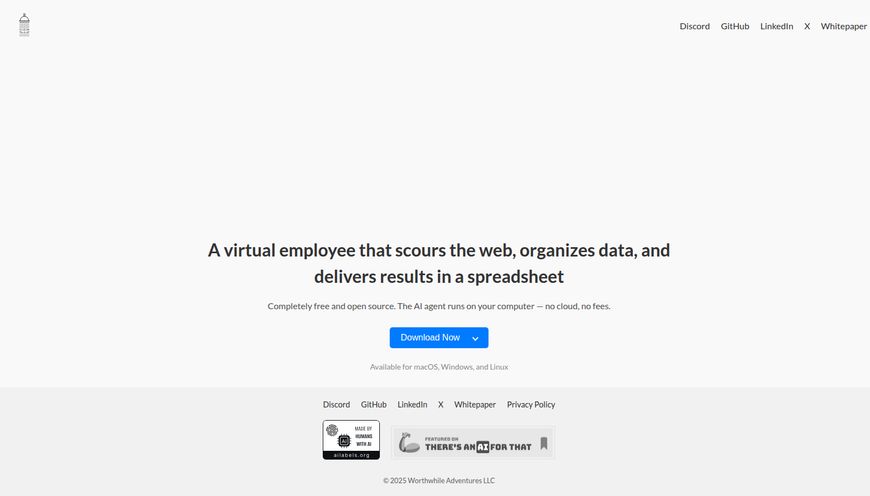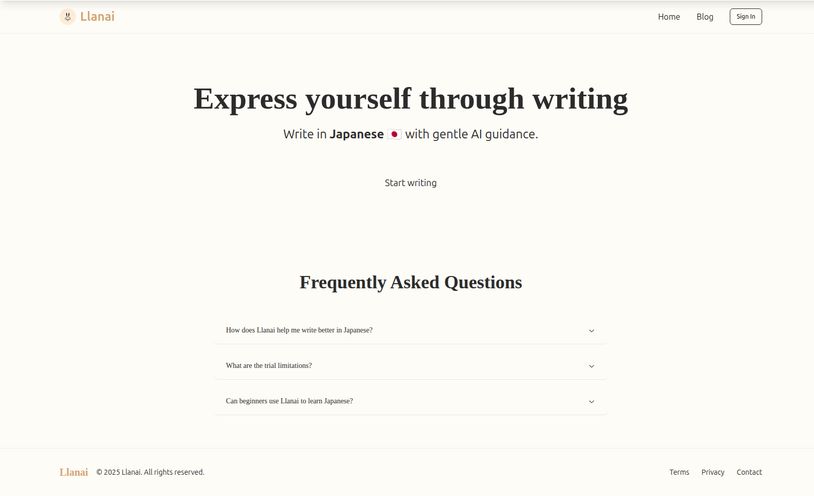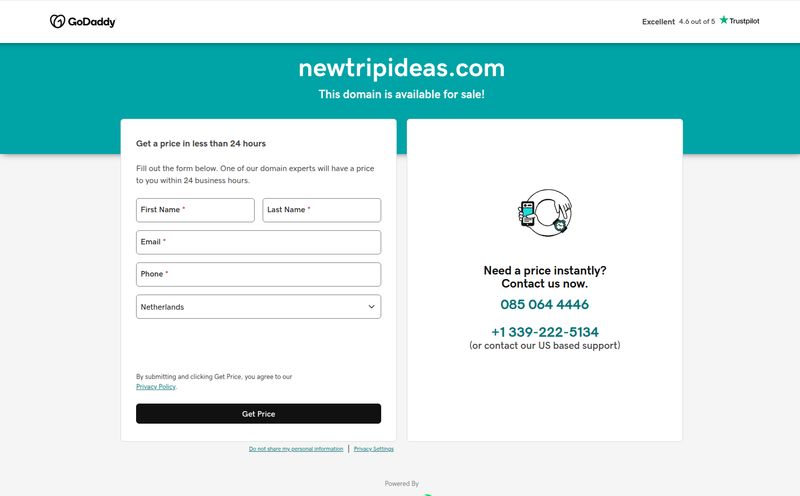You know the scene. You’re planning a trip. You have 27 browser tabs open. One is for flights, three are for hotels in different neighborhoods, seven are travel blogs all recommending the exact same "hidden gem" coffee shop, and the rest are a chaotic mess of train schedules, museum hours, and a Google Map that looks like a spider threw up on it. I’ve been there. We've all been there. It’s the dark side of the glorious adventure that is travel.
For years, we've been promised a tech solution to this madness. A single platform to rule them all. So when I first heard about Itair, an AI-powered travel planner, my inner skeptic, honed by years of lackluster travel apps, rolled his eyes. "Another one?" he grumbled. But the part of me that still gets a thrill from finding the perfect back-alley trattoria leaned in closer. AI, you say? Trained on over a million unique experiences? Okay, Itair. You have my attention.
So, What Exactly is Itair?
At its core, Itair is an all-in-one travel platform that uses artificial intelligence to build you a personalized itinerary. Forget cookie-cutter top 10 lists. The whole idea here is to create a trip plan that reflects your actual interests, not just the most popular tourist traps. It claims to be your personal travel concierge, your local guide, and your logistics manager all wrapped into one sleek interface. It does this by drawing from a massive database of, apparently, over 1 million unique travel experiences. That's a lot of data, and in the world of AI, data is the secret sauce.

Visit Itair
The goal is simple: to streamline the agonizing parts of travel planning so you can focus on the fun parts. It's designed to help you discover those truly special spots—the ones that don't always make it into the big-name guidebooks—and weave them into a coherent, manageable plan.
How Does This AI Magic Actually Work?
While I haven’t seen the code, the process seems pretty straightforward from a user's perspective. You feed the machine your travel DNA. Think of it like this: you tell Itair you’re heading to Lisbon for five days. You’re a foodie who loves historical architecture but gets bored in art museums. You prefer walking over public transport and your budget is more “charming guesthouse” than “five-star luxury.”
The AI then churns through its vast knowledge base. It's not just looking for keywords like "food" and "history." It's looking for patterns. It knows that people who love a certain type of pastry shop in Alfama also tend to enjoy a specific Fado bar in Mouraria. It's connecting dots that you or I would spend hours on Google trying to find. The output is a proposed day-by-day plan, complete with restaurant suggestions, activity timings, and maybe even some notes on which streets are best for a sunset stroll. It’s the promise of a truly custom travel itinerary without the custom price tag.
The Good Stuff: What Gets Me Excited About Itair
I'm a tough critic, but there are a few things about this platform that genuinely pique my interest as a travel pro.
Truly Personalized Itineraries
This is the big one. For too long, "personalization" in travel tech has meant asking if you prefer a window or an aisle seat. The potential for an AI to actually understand nuance—that you want a trip that balances iconic sights with quiet, local moments—is huge. It's about moving beyond the Eiffel Tower and the Colosseum to find experiences that feel like they were picked just for you. Because they were.
Discovering Actual Hidden Gems
The term "hidden gem" has become an SEO-abused cliché, usually pointing to a place with a 3-hour queue. But an AI that isn’t influenced by sponsored content or affiliate marketing could potentially unearth real treasures. By analyzing data from millions of trips, Itair might spot a tiny, family-run restaurant or a breathtaking viewpoint that hasn't been Instagrammed to death yet. That's the dream, isn't it?
A One-Stop Shop for Resources
The convenience factor can't be overstated. Having your itinerary, booking links (I assume), and key information all in one place is a godsend. No more frantic searching through your email for that one hotel confirmation. It's about reducing the friction of travel, which, as any seasoned travler knows, is half the battle.
The Reality Check: Where Itair Might Stumble
Okay, let's bring it back down to earth. No tool is perfect, especially one relying on something as new and complex as AI. I have a few reservations that are worth considering. The reliance on AI can feel a bit... sterile. Some of the best travel moments come from getting lost, from a spontaneous decision to turn down a random alley. Can an algorithm truly account for serendipity? I'm not so sure. Sometimes the most memorable part of a trip is the plan going completely off the rails.
And then there's the data itself. The AI is only as good as the information it's trained on. If the data is biased towards certain types of travel or destinations, the recommendations might feel repetitive. Plus, as with any software, there's always the chance of bugs or application errors at the worst possible moment—like when you’re trying to find your hotel in a new city at 2 AM.
| The Upside | The Potential Downsides |
|---|---|
| AI-powered recommendations can feel incredibly bespoke. | Over-reliance on the plan could stifle spontaneity. |
| Access to a massive pool of travel resources in one place. | The quality of suggestions depends entirely on the AI's data. |
| High potential to discover unique, non-touristy spots. | Like any app, it could have technical glitches or errors. |
Let's Talk Money: The Itair Pricing Situation
Here's the million-dollar question: what does it cost? As of right now, I couldn't find any public pricing information for Itair. This isn't uncommon for platforms in their early stages. It could mean a few things. They might be in a beta testing phase, offering it for free to early adopters to gather feedback. They could be planning a tiered subscription model (e.g., a free basic plan and a premium plan with more features). Or they might be pursuing a B2B model, partnering with travel agencies. For now, we'll have to wait and see. My advice is to keep an eye on their website if you're interested.
My Final Take: Is This the Future of Trip Planning?
Look, I'm an old-school guy in many ways. I love the feel of a paper map and the thrill of manual discovery. But I also hate wasting time and money. A tool like Itair represents a fascinating middle ground. It's not here to replace the human desire for exploration, but to augment it. To act as a super-powered assistant that handles the grunt work.
Is it for everyone? Probably not. If you're a hardcore backpacker who thrives on pure chaos, this might feel too structured. But for the busy professional, the family trying to coordinate a million moving parts, or even the solo traveler who wants a solid foundation to build upon, Itair could be a game-changer. It’s like getting a head start from a friend who knows the destination inside and out. It’s a tool, and like any tool, its value is in how you use it. I'm optimistic but with a healthy dose of realism.
Frequently Asked Questions about Itair
- Is Itair completely free to use?
- Currently, there is no clear pricing information available. The platform may be in a beta phase or operating on a freemium model. It's best to check their official site for the most up-to-date details.
- How is Itair different from just using Google Maps or TripAdvisor?
- While tools like Google Maps are great for navigation and reviews, Itair's main differentiator is its ability to synthesize information into a coherent, personalized itinerary. It doesn't just give you a list of options; it builds a day-by-day plan based on your unique preferences, saving you the step of piecing it all together yourself.
- Can I make changes to the AI-generated itinerary?
- Absolutely. The AI-generated plan should be seen as a starting point. A good travel planner, AI or not, allows for flexibility. You can use its suggestions as a foundation and then swap activities, change timings, or add your own discoveries to the mix.
- Does the AI consider budget constraints when planning?
- Yes, that's a key part of the personalization. When you input your preferences, you should be able to specify a budget range (e.g., budget-friendly, mid-range, luxury), and the AI will tailor its recommendations for accommodation, dining, and activities accordingly.
- What happens if I don't like a suggestion Itair makes?
- You simply ignore it or replace it! The tool is there to serve you, not dictate your trip. The best way to use it is to take what you love, discard what you don't, and use the saved time to discover even more.
The Bottom Line
The world of AI in travel is just getting started, and it's an exciting frontier. Platforms like Itair are moving us away from generic, one-size-fits-all tourism and towards something much more personal and efficient. It won’t plan the perfect trip for you—only you can do that. But it might just give you the perfect blueprint, saving you dozens of hours and countless headaches along the way. And for that reason alone, I'm keeping a very close eye on it.



